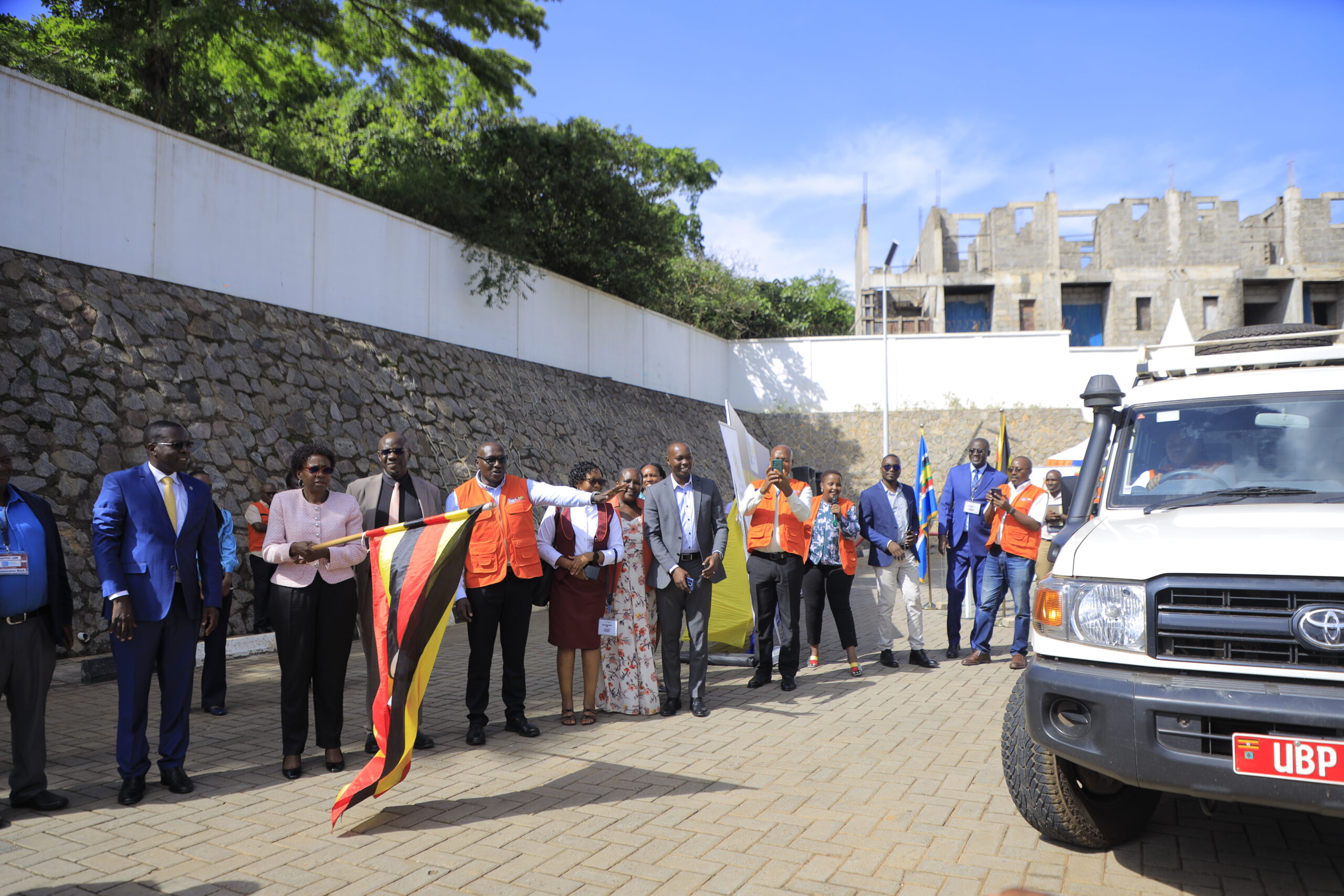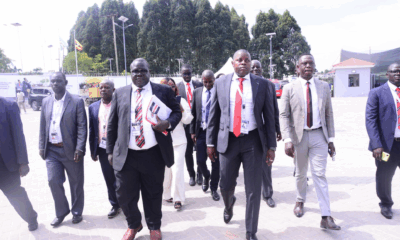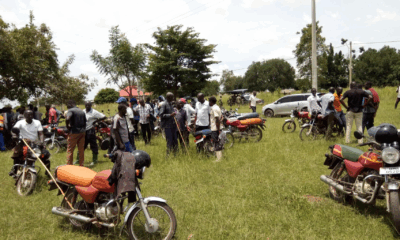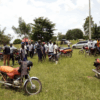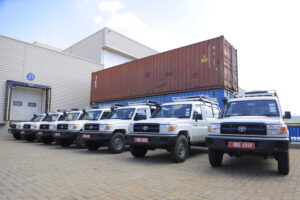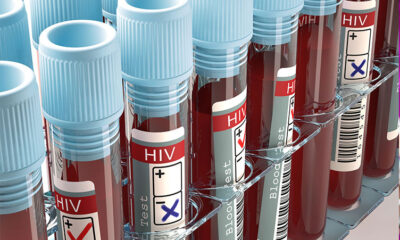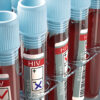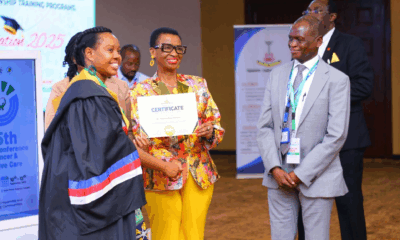Health
National Medical Stores Launches Ambitious “Last-Mile” Initiative to Revolutionize Vaccine Delivery Across Uganda
In a significant move to bolster immunisation efforts and reduce preventable childhood diseases, the National Medical Stores (NMS) launched its groundbreaking Vaccine Last-Mile Delivery (vLMD) initiative.
The rollout of the Vaccine Last-Mile Delivery initiative is a bold step toward achieving universal vaccine coverage and equitable healthcare access across Uganda.
Speaking at the launch event, the Minister of Health, Dr. Jane Ruth Acenge, highlighted the critical importance of efficient vaccine distribution in achieving effective immunisation programmes.
Dr. Acenge revealed that Ministry of Health reports and Effective Vaccine Management (EVM) assessments have consistently pointed to significant hurdles health facilities face in accessing vital immunisation commodities. These challenges have resulted in frequent vaccine stockouts, high wastage, and consequently, an increased number of zero-dose and under-immunised children across the country.
“Only a mere 15% of our health facilities currently receive vaccines directly from district vaccine stores,” Dr. Acenge stated, emphasising the reliance on often unsustainable self-pickup arrangements due to transport limitations and a lack of prioritisation of vaccine distribution at the district level.
The vLMD initiative, building upon NMS’s existing mandate for vaccine procurement, storage, and distribution, aims to directly address these systemic challenges. The core objectives of the initiative are:
Ensuring equitable and timely vaccine distribution by delivering vaccines directly to health facilities. Reducing vaccine wastage at all levels of the supply chain. Minimising stockouts and improving vaccine availability nationwide. Strengthening cold chain management through on-the-job mentorship during deliveries to enhance vaccine stock management practices among health workers.
Dr. Acenge underscored that the vLMD will serve as a crucial intervention to address existing gaps in monitoring, record-keeping, archiving, reporting of key performance indicators, and on-site skills development for personnel handling vaccines.
The Minister announced that NMS has received 20 vans dedicated to supporting vaccine distribution within districts, with an additional eight expected. These vans will be initially managed by NMS to gather crucial data and evidence to inform future implementation strategies.
The acquisition of 28 vans represented a significant investment, totalling Shs6.2 billion (USD 1.6 million). The cost for each vehicle exceeded Shs219.8 million (USD 60,000). Furthermore, operational expenses, encompassing fueling and servicing for the fleet, are estimated at an additional USD 2 million.
Dr. Acenge appealed for collaborative support from all stakeholders, urging them to provide valuable feedback and recommendations to ensure the initiative’s success.
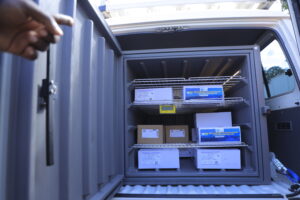
The interior of the dedicated vans has coolers that can keep all the vaccines safe till the last point of delivery, The vans can also manage rough terrains
Representing NMS CEO Moses Kamabare, Mr. Paul Okwera provided further insights into the significance of last-mile delivery. He clarified that this crucial final phase ensures vaccines reach the health facilities where actual vaccinations take place.
Unlike medications for chronic illnesses, vaccines require administration by trained professionals within health facilities and necessitate stringent storage and transportation conditions.
Mr. Okwera highlighted the substantial investments made in central-level vaccine management, including state-of-the-art storage facilities with significant capacity for various temperature requirements. While acknowledging the past reliance on districts for local-level vaccine management and distribution, he pointed out the inconsistencies in performance across the country’s 136 districts.
“What we are trying to achieve here by trying to have a holistic approach to last-mile delivery in the country is to make sure that there is sameness or homogeneity in the service delivery within the country,” Mr. Okwera emphasized. “We don’t expect people to be penalised because there is poor coordination within the district. We expect that the service level throughout the country shall become the same.”
He added that the vLMD initiative will foster greater government ownership of health programs, particularly in the current geopolitical climate. He outlined the benefits NMS would bring to the table, including economies of scale and a centralised coordination system aimed at reducing the individual cost of delivery to health facilities.
Ultimately, the initiative seeks to achieve uniformity of service across the country, benchmark best practices, improve service quality, reduce the burden of zero-dose children, and enhance vaccine accessibility for all populations.
Mr. Okwera announced that the initiative would initially focus on the Busoga region due to its highest burden of under-immunisation, signalling a targeted approach to maximise impact.
The launch of the Vaccine Last-Mile Delivery initiative marks a pivotal moment in Uganda’s efforts to strengthen its health supply chain, improve immunisation coverage, and ultimately safeguard the health and well-being of its children.
The Minister of Health flagged off some of the temperature-sensitive vehicles that will support the distribution of the vaccines within the selected districts.
Andrew Bakainaga from the World Health Organisation welcomed the initiative, alluding that the last-mile delivery is definitely a very effective step towards reaching the last child.
“We all know that in immunisation, we avoid and fight against zero doses. These are children that have not had any vaccine in their life course, and one of the challenges that always brings this about is the unavailability of vaccine at the most remote places where these children are to be found, and therefore introducing and launching this last mile delivery is a great milestone in bringing all the children that need to have their vaccination actually being vaccinated and being fully vaccinated with All the antigens.”

Andrew Bakainaga from WHO
He added; “We would also as a way of ensuring that these vehicles are effectively used, as the district has mentioned, just to caution and say that whoever and wherever they are going to be used, it would be pertinent that they always remember that last child who is actually the best and most important beneficiary for this procurement and so as they’re being used. Let’s continue to sacrifice to make sure that the vaccines are actually reaching the beneficiaries, and we have less of the zero doses in this country and continue to prevent diseases.”
The collaborative spirit and commitment demonstrated by the Ministry of Health, National Medical Stores, and their partners offer a promising outlook for a healthier future for all Ugandans.
Comments



